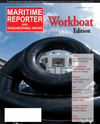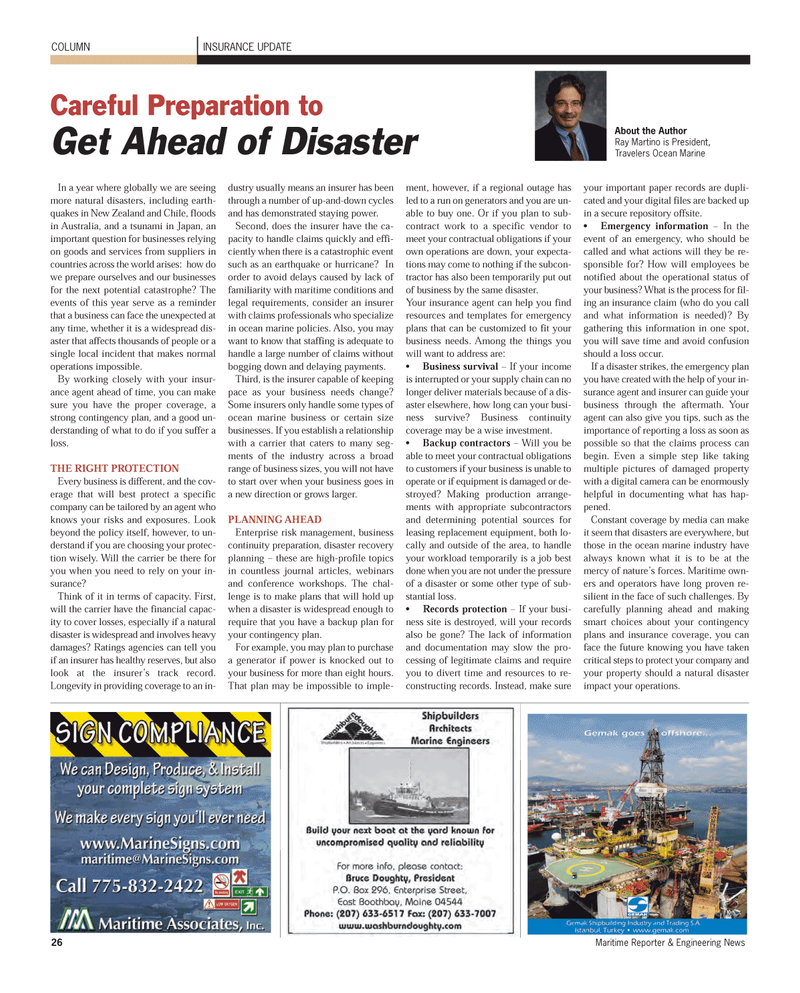
Page 26: of Maritime Reporter Magazine (November 2011)
Feature: Workboat Annual
Read this page in Pdf, Flash or Html5 edition of November 2011 Maritime Reporter Magazine
In a year where globally we are seeingmore natural disasters, including earth-quakes in New Zealand and Chile, floods in Australia, and a tsunami in Japan, an important question for businesses relying on goods and services from suppliers incountries across the world arises: how do we prepare ourselves and our businesses for the next potential catastrophe? The events of this year serve as a reminder that a business can face the unexpected at any time, whether it is a widespread dis- aster that affects thousands of people or a single local incident that makes normal operations impossible.By working closely with your insur- ance agent ahead of time, you can make sure you have the proper coverage, a strong contingency plan, and a good un- derstanding of what to do if you suffer a loss.THE RIGHT PROTECTION Every business is different, and the cov- erage that will best protect a specific company can be tailored by an agent who knows your risks and exposures. Look beyond the policy itself, however, to un- derstand if you are choosing your protec-tion wisely. Will the carrier be there for you when you need to rely on your in-surance?Think of it in terms of capacity. First, will the carrier have the financial capac- ity to cover losses, especially if a natural disaster is widespread and involves heavy damages? Ratings agencies can tell youif an insurer has healthy reserves, but also look at the insurer?s track record. Longevity in providing coverage to an in- dustry usually means an insurer has beenthrough a number of up-and-down cycles and has demonstrated staying power. Second, does the insurer have the ca- pacity to handle claims quickly and effi- ciently when there is a catastrophic event such as an earthquake or hurricane? In order to avoid delays caused by lack of familiarity with maritime conditions and legal requirements, consider an insurer with claims professionals who specializein ocean marine policies. Also, you may want to know that staffing is adequate to handle a large number of claims without bogging down and delaying payments. Third, is the insurer capable of keeping pace as your business needs change? Some insurers only handle some types ofocean marine business or certain size businesses. If you establish a relationship with a carrier that caters to many seg- ments of the industry across a broadrange of business sizes, you will not have to start over when your business goes in a new direction or grows larger. PLANNING AHEADEnterprise risk management, business continuity preparation, disaster recovery planning ? these are high-profile topics in countless journal articles, webinarsand conference workshops. The chal- lenge is to make plans that will hold up when a disaster is widespread enough torequire that you have a backup plan for your contingency plan. For example, you may plan to purchase a generator if power is knocked out to your business for more than eight hours. That plan may be impossible to imple-ment, however, if a regional outage has led to a run on generators and you are un-able to buy one. Or if you plan to sub- contract work to a specific vendor to meet your contractual obligations if your own operations are down, your expecta- tions may come to nothing if the subcon-tractor has also been temporarily put outof business by the same disaster. Your insurance agent can help you find resources and templates for emergency plans that can be customized to fit your business needs. Among the things you will want to address are: Business survival ? If your incomeis interrupted or your supply chain can nolonger deliver materials because of a dis- aster elsewhere, how long can your busi- ness survive? Business continuity coverage may be a wise investment. Backup contractors ? Will you be able to meet your contractual obligations to customers if your business is unable to operate or if equipment is damaged or de-stroyed? Making production arrange- ments with appropriate subcontractorsand determining potential sources forleasing replacement equipment, both lo-cally and outside of the area, to handleyour workload temporarily is a job best done when you are not under the pressureof a disaster or some other type of sub-stantial loss.Records protection ? If your busi- ness site is destroyed, will your records also be gone? The lack of information and documentation may slow the pro- cessing of legitimate claims and require you to divert time and resources to re- constructing records. Instead, make sure your important paper records are dupli-cated and your digital files are backed up in a secure repository offsite. Emergency information ? In theevent of an emergency, who should be called and what actions will they be re- sponsible for? How will employees be notified about the operational status of your business? What is the process for fil- ing an insurance claim (who do you calland what information is needed)? Bygathering this information in one spot, you will save time and avoid confusion should a loss occur. If a disaster strikes, the emergency plan you have created with the help of your in- surance agent and insurer can guide yourbusiness through the aftermath. Your agent can also give you tips, such as the importance of reporting a loss as soon aspossible so that the claims process canbegin. Even a simple step like taking multiple pictures of damaged propertywith a digital camera can be enormouslyhelpful in documenting what has hap-pened.Constant coverage by media can make it seem that disasters are everywhere, but those in the ocean marine industry have always known what it is to be at the mercy of nature?s forces. Maritime own- ers and operators have long proven re- silient in the face of such challenges. By carefully planning ahead and makingsmart choices about your contingency plans and insurance coverage, you can face the future knowing you have taken critical steps to protect your company and your property should a natural disasterimpact your operations. INSURANCE UPDATE COLUMNCareful Preparation to Get Ahead of DisasterAbout the AuthorRay Martino is President, Travelers Ocean Marine 26Maritime Reporter & Engineering News MR Nov.11 # 4 (25-33):MR Template 11/7/2011 1:28 PM Page 26

 25
25

 27
27
